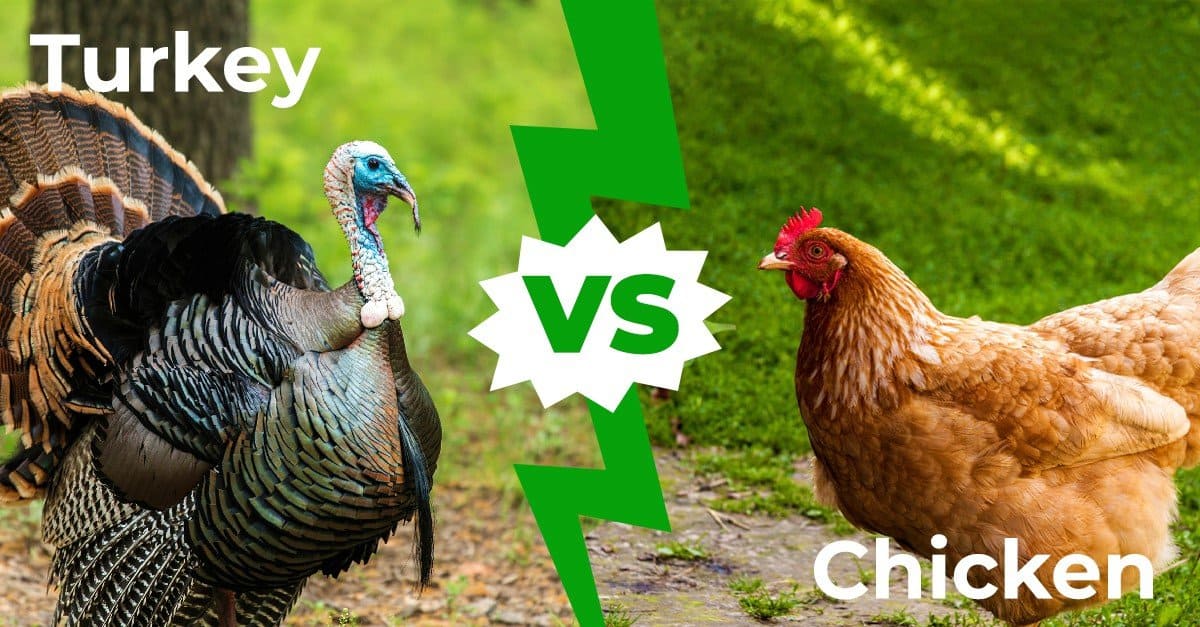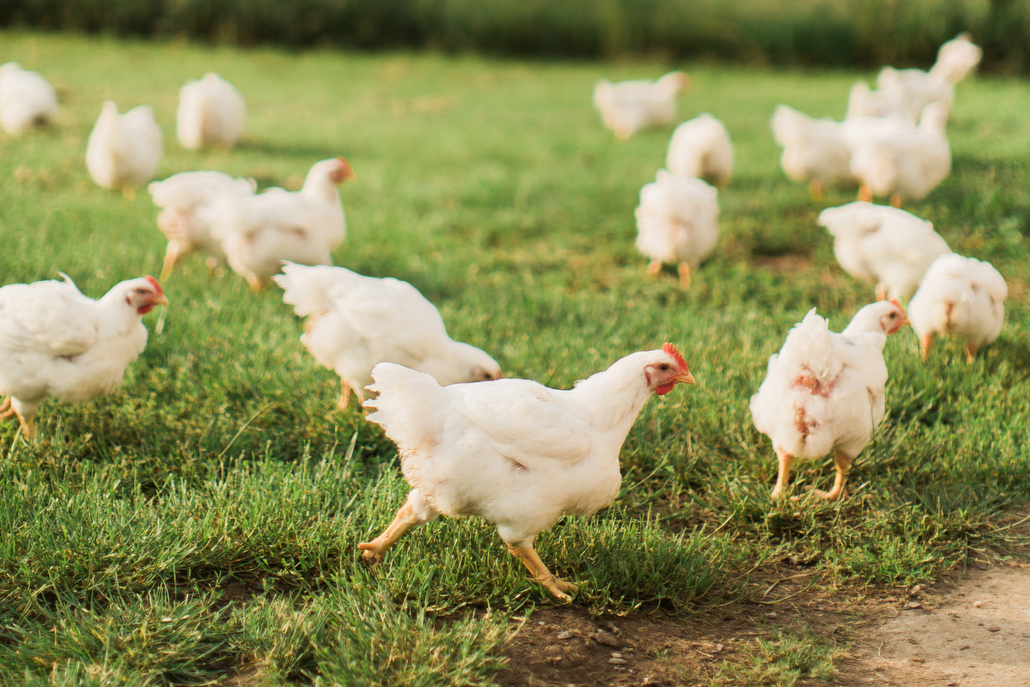With the holiday season coming up, you may find yourself debating between cooking a turkey or chicken as the centerpiece of your festive meal. While both poultry options are nutritious and delicious, turkey and chicken actually have some notable differences. In this article, we’ll explore the key ways that turkeys and chickens are distinct from each other.
Taxonomy – Different Birds Entirely
While turkeys and chickens belong to the same animal kingdom, phylum, class, and order, they are from completely different genuses and subfamilies
Turkeys are part of the Phasianidae subfamily and Meleagris genus, Chickens fall under the Phasianinae subfamily and Gallus genus, This makes them distinctly different types of birds rather than just variations of the same species,
Appearance – Vastly Different Sizes and Looks
The most obvious difference between chickens and turkeys is their appearance.
Turkeys are much larger birds, commonly weighing 16-40 pounds depending on the specific breed Chickens typically range from 2-10 pounds So your average turkey is 3-5 times the size of a standard chicken.
Turkeys have characteristic fleshy wattles hanging from their necks and beaks shaped like hooks. Their feathers are generally bold patterns of brown, black, grey, red, and white.
Chickens have smaller combs and wattles on their heads. Their beaks are tapered. Plumage wise, chickens have a wide variety of feather patterns and colors including solid white, brown, black, and speckled mixes.
So if you’re wondering whether that massive bird on the table is a turkey or chicken, just check the size and distinctive facial features.
Flavor Profiles – Turkey Has Richer, Bolder Taste
One of the biggest factors in choosing between chicken or turkey is the difference in taste. Both have mild-tasting white breast meat. However, turkey is notably more savory and succulent.
The dark turkey meat is intensely flavored with a “deep” richness. The legs and wings have more natural fat and connective tissue that enriches the flavor when cooked. The skin also has higher fat content for crispier texture.
Chicken breast meat is milder and more delicate. The dark meat has a much lighter taste compared to the robust turkey leg. So if you want a bolder, meatier flavor for a special meal, turkey has the advantage over chicken in the taste department.
Cooking Methods – Turkey Requires Lower Heat, More Time
Preparation and cooking methods do vary between the two birds due to their size differences. Whole turkeys are significantly larger than chickens so they require more time and more even heat.
Turkeys are often cooked at a lower oven temperature (325°F) for a long roasting time to allow the interior meat to cook through without drying out the exterior. Chickens can be roasted at higher heats (350-375°F) for quicker cooking.
Turkey benefits from brining before cooking to infuse flavor and moisture throughout the meat. Chickens do not need brining. Trussing and basting are also useful techniques for evenly cooked turkeys.
Nutrition Comparison – Turkey Has Less Fat, More Sodium
Both turkey and chicken are lean sources of quality protein. However, there are some nutritional differences in the fat, cholesterol, and sodium content.
Turkey breast has slightly less total fat, saturated fat, and cholesterol compared to chicken breast. But turkey contains notably higher sodium levels.
So turkey wins out for being the leaner option while chicken has less sodium per serving. For other nutrients like vitamins, minerals, and macros, they are fairly similar.
Cost Differences – Turkey is Cheaper Per Pound
Budget may also factor into whether you serve chicken or turkey. Generally, whole turkeys cost less per pound compared to whole chickens.
A supermarket turkey often comes in around $1 per pound before holiday price hikes. An equivalent whole chicken may cost $1.50-$2 or more per pound.
However, smaller turkey breast roasts without bone-in parts can be comparable to chicken costs per pound. Buying turkey parts like just drumsticks may also be pricier than chicken pieces.
So if cost savings are your goal, a whole turkey usually gives you more bang for your buck compared to chickens.
occasions – Turkey for Holidays, Chicken More Versatile
Tradition plays a role as turkey is strongly associated with holiday feasts like Thanksgiving, Christmas, and Easter. You’ll rarely see turkey on everyday menus.
Chicken is more versatile as an ingredient. It shows up in salads, sandwiches, soups, casseroles, and as fried or grilled mains throughout the year. While you can sub turkey in some recipes, chicken is still the more popular choice for non-holiday cooking.
So if you’re planning a special dinner, turkey may feel more celebratory. But chicken is convenient and easy for weekly meals.
Which Should You Choose? Consider Your Priorities
When it comes to selecting turkey or chicken for dinner, consider your priorities in terms of budget, taste, nutrition, and usage.
If you want bold, rich flavor for a holiday spread, then turkey may be your best pick. But for affordable and versatile meals any night of the week, chicken has the advantage.
Either way, both poultry choices provide high-quality protein and nutrients. The differences ultimately come down to size, taste, cost, and what best suits your cooking needs. With the key comparisons in mind, you can decide whether turkey or chicken is right for your upcoming meals.

What’s The Better Protein Source: Chicken or Turkey?
Protein is having its moment in American culture as many people have begun focusing on increasing their intake to meet health goals. This month, we’re examining two popular protein sources, chicken and turkey, comparing their nutritional content and explaining how much protein your body needs to survive and thrive.

Dark Turkey Meat Has A Little More Protein Compared to Dark Chicken Meat.
Dark meat refers to cuts with a reddish-brown color. This color comes from myoglobin, which helps carry and store oxygen in muscle cells. Typically, dark meat is found in more active body parts, like the legs and thighs.
When it comes to dark meat, a turkey thigh delivers more protein (27.7g), slightly fewer calories (165) and less fat (6.04g) than a chicken thigh.
Calories: 179 Protein: 24.8 g Carbs: 0 g Fat: 8.2 g
Calories: 165 Protein: 27.7 g Carbs: 0 g Fat: 6.04 g
Is Turkey Really Better For You Than Chicken?
FAQ
Is turkey meat the same as chicken?
Is turkey a bird or chicken?
What is the difference between a turkey and a hen?
